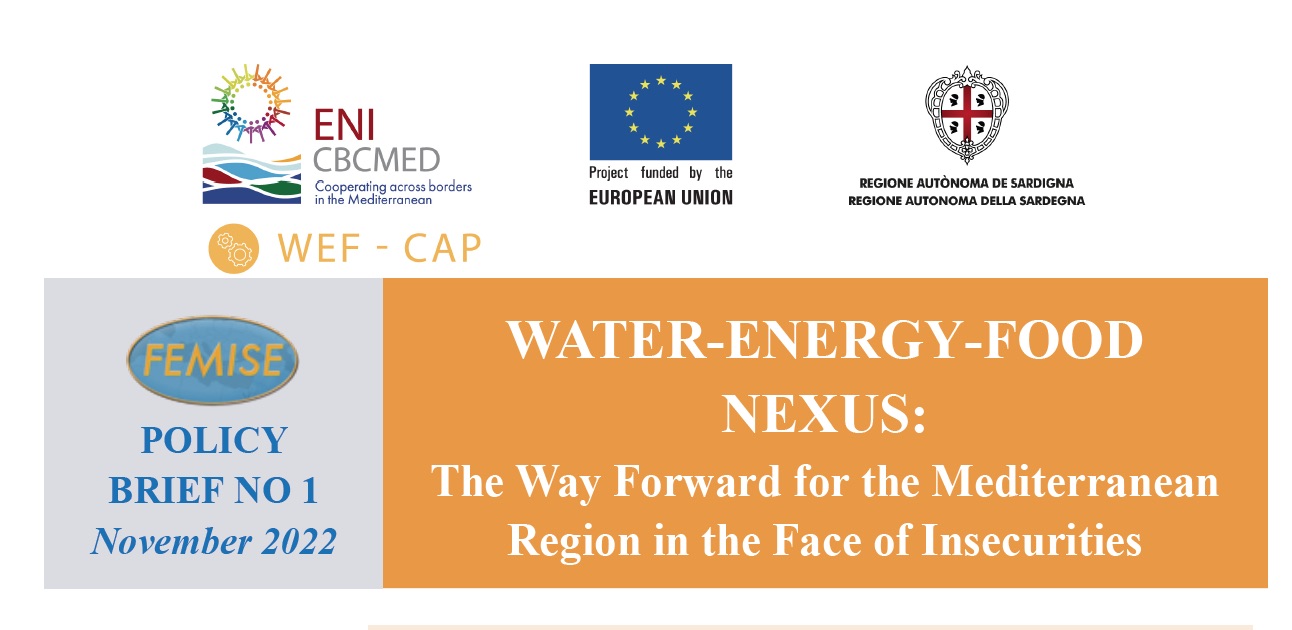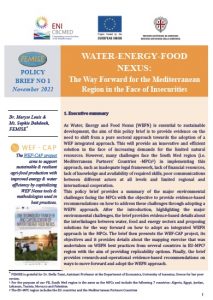 By 2050, food imbalance in EU-MPC is forecast to reach 60%. Sustainable water resources management is closely related to food security as 70% of global freshwater withdrawals are driven by agriculture. Energy plays a key role in producing/distributing food as well as in extracting/treating/supplying water. Climate projections to 2050 reflect an average temperature increase of 2°C, leading to a 5–10% fall in precipitation and more frequent extreme climatic events, potentially halving agricultural production by 2100. Beyond political uncertainty, generalized economic slowdown, and macroeconomic instability, EUMPC region also needs societal adaptation to climate change through new cross-sectoral approaches to manage energy/water resources and efficiently produce more food for an increasing population. Furthermore, the recent COVID19 pandemic exposed the fragility of supply chains, the importance of localized production, and the importance of investment in and capitalization of key enabling technologies, and the need to foster vulnerable groups.
By 2050, food imbalance in EU-MPC is forecast to reach 60%. Sustainable water resources management is closely related to food security as 70% of global freshwater withdrawals are driven by agriculture. Energy plays a key role in producing/distributing food as well as in extracting/treating/supplying water. Climate projections to 2050 reflect an average temperature increase of 2°C, leading to a 5–10% fall in precipitation and more frequent extreme climatic events, potentially halving agricultural production by 2100. Beyond political uncertainty, generalized economic slowdown, and macroeconomic instability, EUMPC region also needs societal adaptation to climate change through new cross-sectoral approaches to manage energy/water resources and efficiently produce more food for an increasing population. Furthermore, the recent COVID19 pandemic exposed the fragility of supply chains, the importance of localized production, and the importance of investment in and capitalization of key enabling technologies, and the need to foster vulnerable groups.
Based on this reality, the need to foster and capitalize WEF NEXUS innovations is increasingly pivotal for social and economic growth and resilience, and towards better policies for inclusive and sustainable economic and social development. The WEF-CAP project has identified an opportunity to efficiently capitalize WEF NEXUS practices (and commercialization tools and methodologies), by consolidating a regional metacluster that fosters cooperation and tech-transfer while mainstreaming policy impact for innovation-driven growth, thus effectively supporting education, research, technological development, and innovation.
The first Policy Brief, which is produced as part of the series of Policy Briefs undertaken in partnership between FEMISE, RSS, ANPE, CRES, UNICT, UAB and ECITD in the WEF-CAP project, is entitled: WATER-ENERGY-FOOD NEXUS: The Way Forward for the Mediterranean Region in the Face of Insecurities by Dr. Maryse Louis & Ms. Sophie Dahdouh, FEMISE.
The Policy Biref is available here
Summary
 As Water, Energy and Food Nexus (WEFN) is essential to sustainable development, the aim of this policy brief is to provide evidence on the need to shift from a pure sectoral approach towards the adoption of a WEF integrated approach. This will provide an innovative and efficient solution in the face of increasing demands for the limited natural resources. However, many challenges face the South Med region (i.e. Mediterranean Partners’ Countries -MPCs) in implementing this approach, such as inadequate legal framework, lack of financial resources, lack of knowledge and availability of required skills, poor communications between different actors at all levels and limited regional and international cooperation.
As Water, Energy and Food Nexus (WEFN) is essential to sustainable development, the aim of this policy brief is to provide evidence on the need to shift from a pure sectoral approach towards the adoption of a WEF integrated approach. This will provide an innovative and efficient solution in the face of increasing demands for the limited natural resources. However, many challenges face the South Med region (i.e. Mediterranean Partners’ Countries -MPCs) in implementing this approach, such as inadequate legal framework, lack of financial resources, lack of knowledge and availability of required skills, poor communications between different actors at all levels and limited regional and international cooperation.
This policy brief provides a summary of the major environmental challenges facing the MPCs with the objective to provide evidence-based recommendations on how to address these challenges through adopting a WEFN approach.
After the introduction, highlighting the major environmental challenges, the brief provides evidence-based details about the interlinkages between water, food and energy sectors and proposing solutions for the way forward on how to adopt an integrated WEFN approach in the MPCs. The brief then presents the WEF-CAP project, its objectives and it provides details about the mapping exercise that was undertaken on WEFN best practices from several countries in EU-MPC region with the aim of providing replicability options. Finally, the brief provides research-and-operational evidence-based recommendations on ways to move forward and adopt the WEFN approach.
WEF-CAP PROJECT
https://enicbcmed.eu/projects/wef-cap
Twitter: @WefCap
Facebook: Wef-Cap Project
Copyright notice: Copyright © WEF-CAP.
WEF-CAP (THE TECHNOLOGY TRANSFER AND CAPITALIZATION OF WATER ENERGY FOOD NEXUS) is a project part of the ENI CBC MED Programme supported by the European Union through the Grant Agreement nº C_A.2.1_0069 running from 1st of September 2021 to 31th of August 2023.
This document is provided by the copyright holders and contributors “as is” and any express or implied warranties, including, but not limited to, the implied warranties of merchantability and fitness for a particular purpose are disclaimed. In no event shall the copyright owner or contributors be liable for any direct, indirect, incidental, special, exemplary, or consequential damages (including, but not limited to, procurement of substitute goods or services; loss of use, data, or profits; or business interruption) however caused and on any theory of liability, whether in contract, strict liability, or tort (including negligence or otherwise) arising in any way out of the use of this document, even if advised of the possibility of such damage. The ENI CBC MED Programme is not liable for any use that may be made of the information contained therein.


